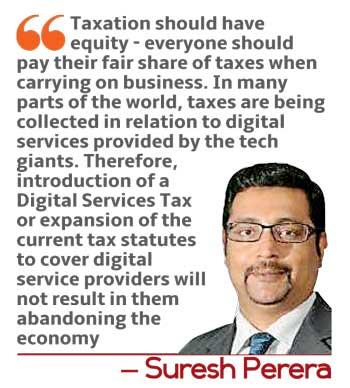Reply To:
Name - Reply Comment

This article is based on a KPMG Academy webinar addressed by Senior Manager Mirani Ratnarajah, Principal Rifka Ziyard and Principal and Head of Tax Suresh Perera, where key insights into the changing landscape of digital taxation were shared.
 In today’s fast-paced and technology-driven world, digital services have become an integral part of our daily lives and revolutionized the way we communicate, work, and access information. One of the key benefits of digital services is their convenience - with just a few clicks or taps on a screen, we can purchase groceries, pay bills, order food, or connect with colleagues and family.
In today’s fast-paced and technology-driven world, digital services have become an integral part of our daily lives and revolutionized the way we communicate, work, and access information. One of the key benefits of digital services is their convenience - with just a few clicks or taps on a screen, we can purchase groceries, pay bills, order food, or connect with colleagues and family.
Overview of different types of digital services
There is a wide variety of digital services available to consumers. These services can be categorized into several types, each serving a different purpose and catering to different needs.  One type of digital service is e-commerce platforms like Daraz, Amazon and eBay, which allow users to shop for products online and have them delivered to their doorstep. This has made shopping more convenient, with a seemingly endless array of products available at our fingertips.
One type of digital service is e-commerce platforms like Daraz, Amazon and eBay, which allow users to shop for products online and have them delivered to their doorstep. This has made shopping more convenient, with a seemingly endless array of products available at our fingertips.
Another type of digital service is online travel agencies such as Booking.com and Expedia, which offer a wide range of accommodation options at competitive prices, allowing users to search for hotels based on their preferences, such as location, price range, and amenities. Additionally, vacation rental websites like Airbnb connect travelers directly with property owners who rent out their homes or apartments, providing unique accommodations that cannot be found in traditional hotels.
Other digital services include entertainment and music streaming platforms such as Netflix and Spotify which offer users access to a vast library of movies, TV shows and songs, revolutionizing the way we consume media. There are communication services like Microsoft Teams and Zoom that enable users to connect with others through video calls and messaging. These services have become essential in today’s world, especially in light of the COVID-19 pandemic when many were forced to work remotely.
There are varying of digital services for food delivery that cater to different needs and preferences. Traditional food delivery apps allow users to browse through a variety of restaurants in the area and place orders for delivery or pickup, also offering discounts and promotions to attract customers.
With the rise of digital services, social media platforms from Facebook to Instagram to Twitter have provided a virtual space to share information and opened up new opportunities for businesses and individuals to promote their products and services. Through targeted advertising and influencer partnerships, companies can reach a wider audience and increase their brand awareness.
Other types of digital services include freelancing platforms (such as Fiverr and Upwork, where individuals can offer services and connect with clients, providing a way for freelancers to showcase their skills, find work opportunities, and build a successful career), online payment services (like paypal, koko and mintpay), online education sites (such as coursera or onlineaccounting.lk), search engines (Google and Yahoo), cloud storage (iCloud and Google Drive) and content management services.
Taxation of digital goods
With the rise of online platforms and e-commerce, the taxation of digital services has become a hotly debated topic, with governments around the world grappling with how to effectively tax these services. The Government of Sri Lanka imposes taxes mainly of two types in the forms of direct taxes and indirect taxes, which have been designed for a world of brick-and-mortar businesses and physical goods. However, as the global economy continues to change, the established tax regulations do not capture the new, often digital business models, affecting government revenues as well as economic efficiency.
Another feature of these taxes is that they are territorial in nature – only the portion of a corporation’s income originating within the country’s borders are taxed to prevent double taxation of cross-border flows. As such, while domestic providers of digital services are subject to tax, online supply through foreign digital platforms escapes taxation. As a result, domestic businesses are at a cost disadvantage, and could lose competitiveness relative to lower-taxed foreign firms operating in the digital markets. With substantial amounts of money being transferred to foreign bank accounts without proper taxation, there is a need to establish a common business environment for both local and international companies engaged in internet-based activities in order to foster a level playing field.
Tax challenges of digitalisation
The complex and constantly evolving nature of digital services presents significant challenges for local tax authorities and policy makers in effectively taxing these transactions. One of the issues raised is how to attribute value created from the generation of data through digital products and services. The development of digital services also creates uncertainties in relation to the proper characterisation of payments made - is it a royalty, right to use, service fee, profit? Characterisation can differ based on each business model. These challenges raise questions as to whether the current international tax framework continues to be appropriate to deal with the changes brought about by the digital economy.
There are two approaches for taxation of revenue from digital services. One would be to extend the existing tax statutes to accommodate revenue generated by digital transactions. The other would be to introduce a unique tax to capture digital services.
Digital Economy – An Indian Tax Perspective
In 2016, India became one of the first countries to impose an Equalization Levy on digital advertising and related services, a provision later expanded in 2020 to include the sales of online goods and services. The tax rate under the Equalization Levy depends on the type of service or transaction. For specified digital services, such as online advertising, the rate is 6 percent of the gross consideration. For e-commerce transactions, such as online sale of goods or services, the rate is 2 percent of the gross consideration. The Equalization Levy aims to level the playing field between foreign and domestic e-commerce companies. For example, if a non-resident e-commerce operator sells goods to residents in India, an Equalization Levy of 2 percent would be levied on the operator. Another example is if a non-resident entity provides online advertising services to an Indian resident, an Equalization Levy of 6 percent would be levied on the service provider.
In addition to the above measures, India has also adopted the concept of “Significant Economic Presence” (SEP), expanding the scope of taxing incomes of non-residents doing business in India. When non-residents solicit business activities or engage in interactions with the Indian population – a SEP is created and the tax authority can levy income tax on the income attributable to that SEP, based on various factors such as revenue, user base, and digital footprint. One of the primary objectives is to bring into tax net, income arising from new business models such as digital transactions, which do not require non-residents’ physical presence in the respective countries. “India’s Equalization Levy and Significant Economic Presence (SEP) are two key components of the country’s efforts to ensure fair taxation in the digital economy, and create a very robust tax framework” concluded Suresh Perera.
OECD Pillar One and Future of Digital Services Taxes
The Organization for Economic Cooperation and Development (OECD) has been at the forefront of developing a multilateral approach to digital taxation in order to address the challenges posed by the digital economy. With the rise of multinational tech companies operating across borders, traditional tax rules have struggled to keep up with the changing landscape. The OECD’s efforts aim to ensure that these companies are taxed fairly and that countries can effectively collect taxes on digital services.
Pillar One – Re-allocation of taxing rights
Pillar One aims to achieve a more equitable distribution of profits and taxing rights across countries with respect to the largest multinationals, including those in the digital sector. It would re-allocate some taxing rights over multinationals from their home countries to the markets where they have business activities and earn profits, regardless of whether firms there have a physical presence there.
Under Pillar One, redistribution would apply where a multinational has global revenues exceeding 20 billion EURO per annum, as well as a profit-before-tax to revenue ratio exceeding 10 percent to market jurisdictions each year depending on customer base / actual value creation. However, it was announced that there would be a delay in the timeline for finalizing the multilateral convention that would implement Pillar One.
The current geopolitical landscape
New Zealand recently introduced legislation for a digital services tax on large multinational companies, w.e.f 2025 after talks for a global rollout did not reach consensus at the OECD. The DST Bill introduced in September 2023, proposes to implement a flat 3 percent digital services tax targeting multinational businesses that earn income from New Zealand users of social media platforms, search engines, and online marketplaces.
From 1 April 2020, the UK Government introduced a new 2 percent tax on the revenues of search engines, social media services and online marketplaces which derive value from UK users.
The Nepali Inland Revenue Department has unveiled details on the taxation of digital service transactions provided by nonresident taxpayers to consumers in Nepal, with transactions valued at more than NPR 2 million per income year. The DST rate is 2 percent of the total transaction value.
A 6 percent service tax has been implemented for digital services in Malaysia from 1st Jan 2020 onwards, with the rate expected to surge to 8 percent in 2024.
Where does Sri Lanka stand?
While the taxation of digital services has been brought up in budget proposals and various forums, no unique digital services tax has been enacted, nor any move to amending existing tax statutes been made. Sri Lanka can seek to attract more internet-based companies and drive economic development in the digital age by fostering a fair and transparent business environment through the introduction of a digital service tax. While some argue that this tax may deter foreign investment, it is a necessary step towards creating a more equitable tax system.
“Taxation should have equity - everyone should pay their fair share of taxes when carrying on business. In many parts of the world, taxes are being collected in relation to digital services provided by the tech giants. Therefore, introduction of a Digital Services Tax or expansion of the current tax statutes to cover digital service providers will not result in them abandoning the economy,” concluded Perera.
Overall, the variety of digital services available today has transformed the way we live our lives and become an integral part of our daily routines. It is clear that the taxation of digital services is a complex issue that requires careful consideration and collaboration among nations in order to create a system that is fair and effective for all parties involved.